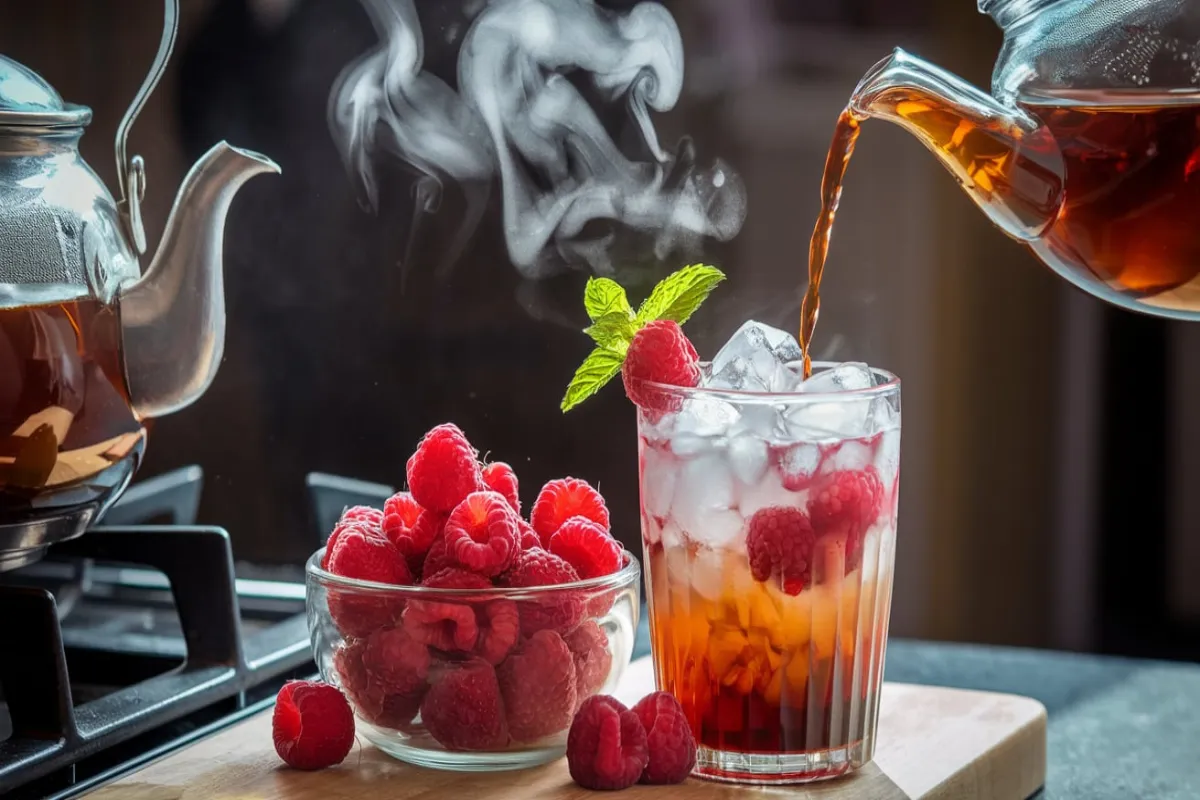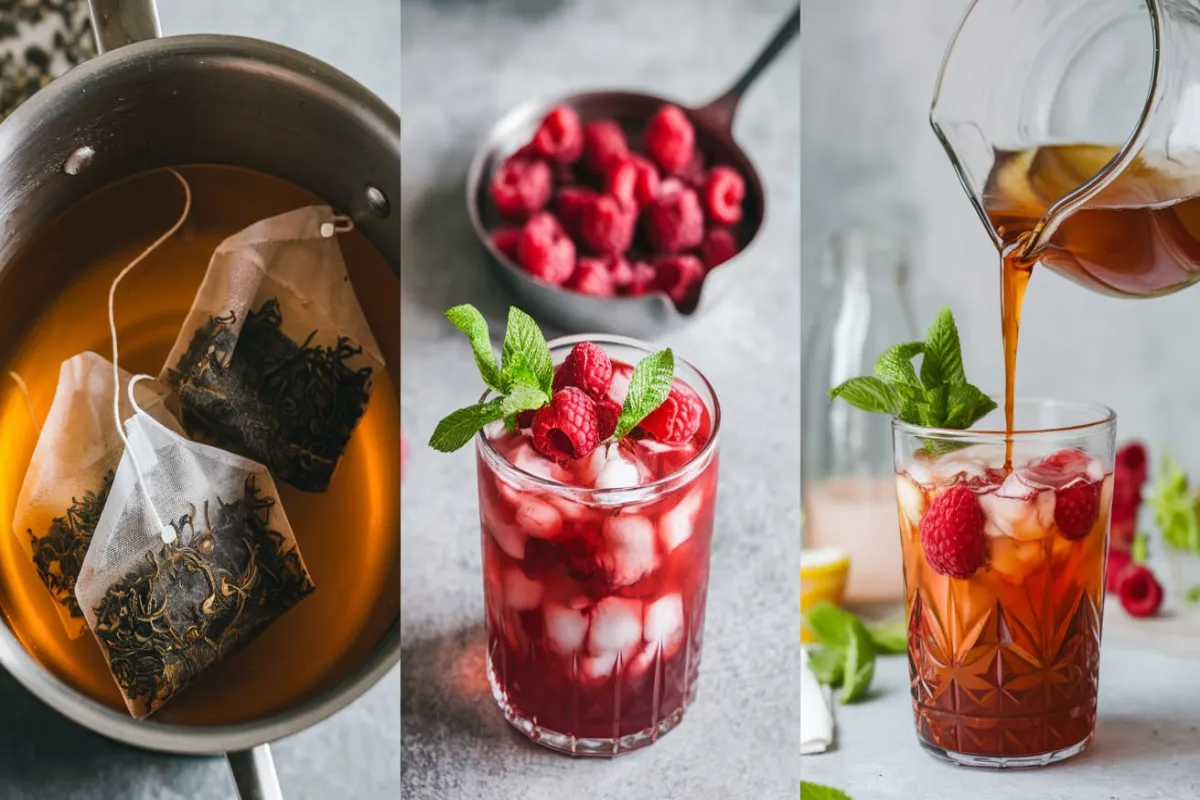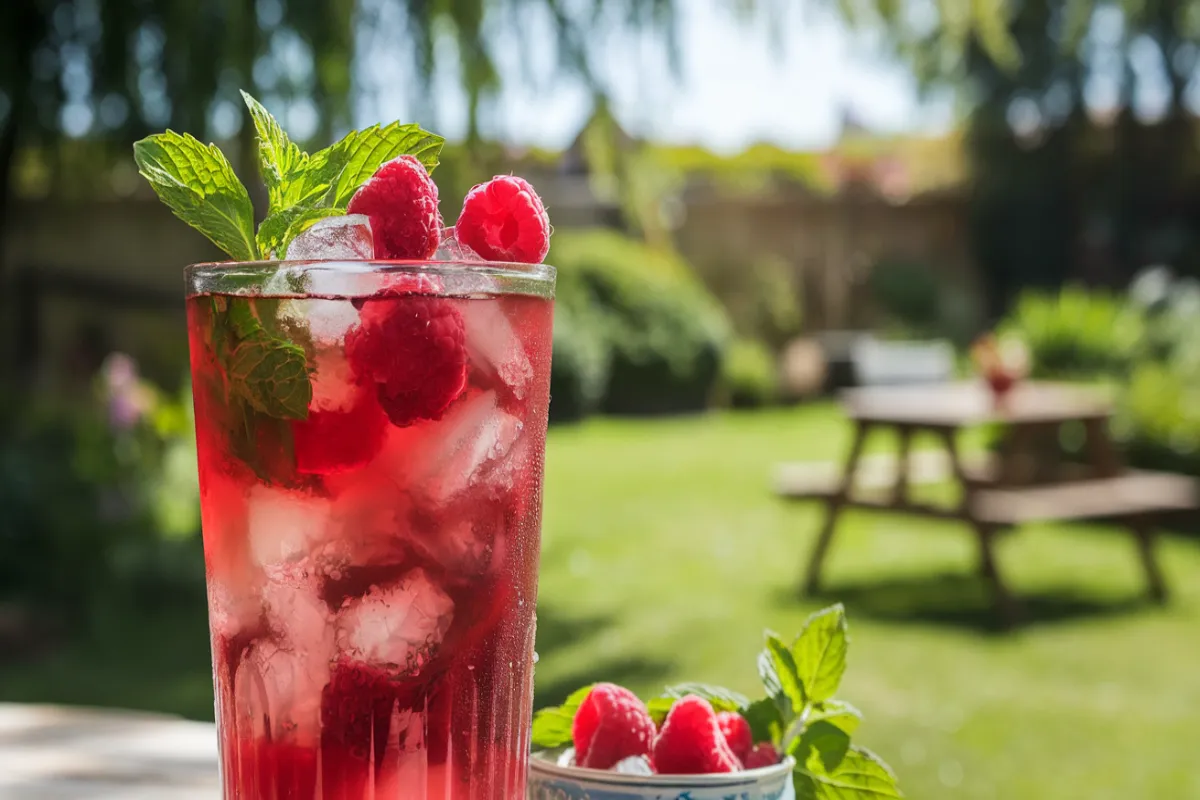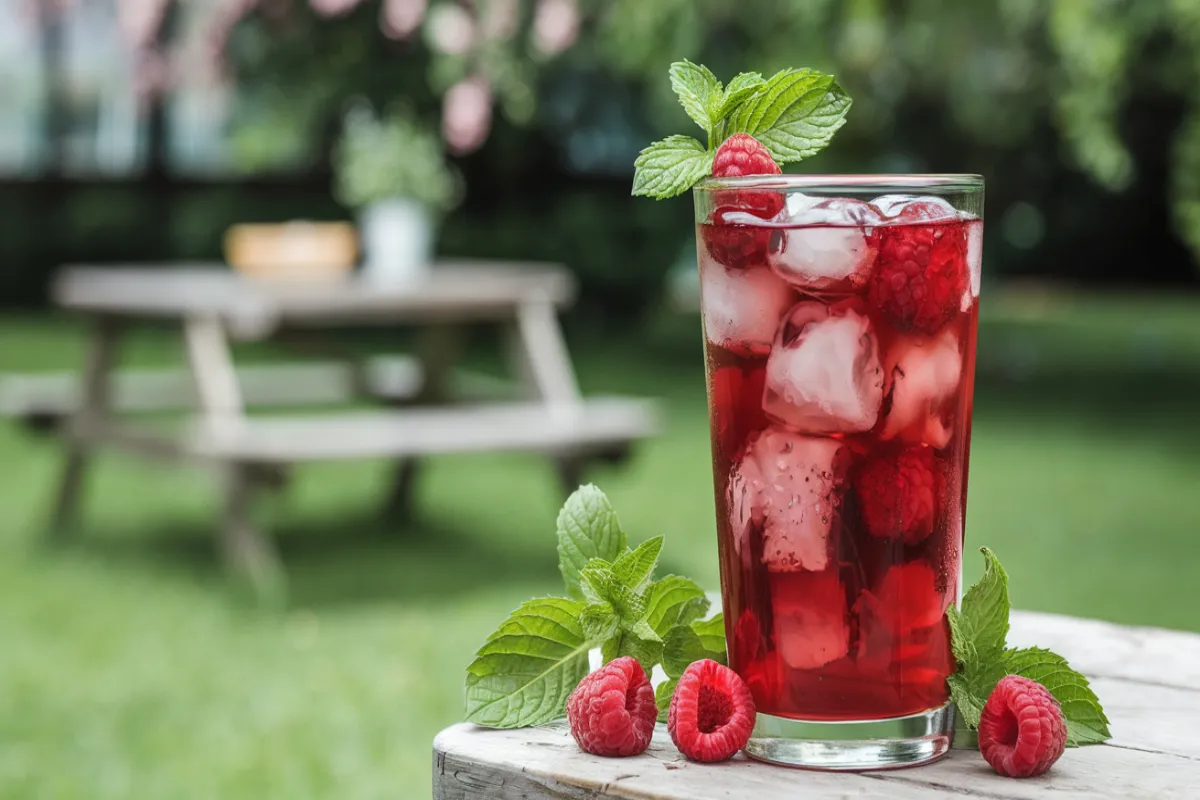Introduction
Raspberry tea is a popular herbal infusion made from the leaves of the red raspberry plant (Rubus idaeus), and it has long been valued for its health benefits. While many people are familiar with the flavor of raspberry fruit, raspberry tea offers a distinct taste that may surprise you. The flavor profile of raspberry tea is more subtle and complex than the bright, sweet, and tart flavor of the fruit. In this article, we’ll explore what raspberry tea tastes like, how it differs from other herbal teas, and how you can enhance its flavor to suit your preferences.
Whether you’re a tea enthusiast or someone curious about trying raspberry tea for the first time, this guide will give you a deep understanding of its unique taste and how to enjoy it to the fullest.
What Is Raspberry Tea?
Before we dive into the flavor of raspberry tea, it’s essential to understand what this tea is and how it’s made. Unlike raspberry fruit tea, which is made from the berries themselves, raspberry leaf tea is brewed using the dried leaves of the red raspberry plant. These leaves are packed with nutrients, including vitamin C, magnesium, potassium, and calcium, making the tea not only delicious but also beneficial for your health.

What Does Raspberry Tea Taste Like?
Raspberry tea offers a mild, earthy flavor that is quite different from the sweet and tangy taste of raspberry fruit. It’s not a strongly flavored tea, but rather subtle and balanced, making it a perfect choice for those who enjoy more delicate herbal teas. Let’s break down its key flavor characteristics:
1. Earthy and Herbal Notes
The most prominent flavor in raspberry tea is its earthy quality. Because the tea is made from the plant’s leaves rather than the fruit, you won’t find the same sweetness or tartness that you get from raspberries. Instead, the flavor is more herbal, with a grounding, slightly woodsy note. This earthy base makes the tea feel smooth and calming, perfect for sipping throughout the day.
2. Mild Fruity Undertones
While raspberry tea doesn’t have the bold, fruity taste of raspberry juice, you can detect faint fruity undertones. These delicate hints of berry flavor add a touch of lightness to the tea, making it more refreshing than some other herbal teas. The fruitiness is subtle, more like a whisper of raspberry than a full-on flavor explosion, which makes it enjoyable for those who prefer more understated flavors.
3. Astringency
Raspberry tea has a mild astringency, similar to green tea or black tea, though not as intense. The astringent quality comes from the tannins in the raspberry leaves, which give the tea a slightly dry mouthfeel. This gentle astringency helps balance out the earthiness and adds a layer of complexity to the overall taste.
4. Slight Sweetness
Although raspberry tea is not naturally sweet like the fruit, it does have a very slight sweetness, especially when brewed with higher-quality leaves. This sweetness is delicate and almost floral, providing a nice contrast to the tea’s earthy and herbal notes. For those who prefer sweeter teas, adding honey or a natural sweetener can enhance this subtle sweetness.
How Raspberry Tea Differs from Other Herbal Teas
When comparing raspberry tea to other herbal teas, you’ll notice several differences in flavor. Here’s how raspberry tea stacks up against some common herbal teas:
- Chamomile Tea: Chamomile tea is floral and sweet, with a calming, almost honey-like taste. Raspberry tea, on the other hand, is more earthy and mild, lacking the pronounced floral notes of chamomile.
- Peppermint Tea: Peppermint tea is bright and refreshing with a strong, minty flavor. Raspberry tea, by contrast, is more subtle and grounding, with no minty or cooling qualities.
- Hibiscus Tea: Hibiscus tea is tart, fruity, and intensely flavorful, while raspberry tea has only mild fruity undertones. Hibiscus tea is much more bold and tangy compared to the gentle taste of raspberry tea.
If you enjoy herbal teas with more subtle, earthy, and calming flavors, raspberry tea is an excellent choice. However, if you prefer strong, sweet, or floral teas, you may want to combine raspberry tea with other herbs to create a flavor profile that better suits your taste.

Enhancing the Flavor of Raspberry Tea
While raspberry tea has a pleasant, mild taste on its own, there are several ways you can enhance its flavor to suit your personal preferences. Here are a few ideas:
1. Add a Sweetener
If you prefer your tea on the sweeter side, adding a touch of honey, agave, or maple syrup can elevate the flavor of raspberry tea. The natural sweetness complements the tea’s mild fruity undertones and balances out the herbal, earthy notes.
2. Mix with Other Herbal Teas
Raspberry tea pairs wonderfully with other herbal teas to create more complex flavor combinations. For a refreshing twist, mix raspberry tea with peppermint or lemon balm. If you want to enhance the fruity flavor, try blending it with hibiscus or rosehip tea, which will add tartness and additional layers of flavor.
3. Add Fresh Fruit or Fruit Juice
For a burst of flavor, add fresh fruit slices such as lemon, orange, or even raspberries to your tea. A splash of fruit juice, like apple or pomegranate, can also add a touch of sweetness and acidity to complement the tea’s natural earthiness.
4. Serve Iced
Raspberry tea tastes delicious both hot and cold, but serving it iced can give it a whole new level of refreshment. Brew the tea, let it cool, and pour it over ice for a thirst-quenching beverage on a hot day. For an extra refreshing touch, add fresh mint leaves and a few raspberries for garnish.
Health Benefits of Raspberry Tea
Beyond its pleasant taste, raspberry tea is packed with health benefits, making it a functional addition to your diet. Here are a few of its key health advantages:
1. Supports Reproductive Health
Raspberry tea is well-known for its benefits to women’s reproductive health. It has been traditionally used as a uterine tonic, helping to tone and strengthen the uterus. This makes it particularly popular among women during pregnancy and menstruation, as it may help reduce labor pain and ease menstrual cramps.
2. Rich in Antioxidants
Raspberry leaves are loaded with antioxidants, such as tannins and flavonoids, which help protect the body from oxidative stress. These compounds support overall health by neutralizing free radicals that can cause cellular damage and increase the risk of chronic diseases.
3. Boosts Immune Function
Thanks to its high vitamin C content, raspberry tea can help boost the immune system and protect against common illnesses like colds and flu. Regular consumption of this tea can help keep your immune system functioning optimally, especially during the colder months.
4. Supports Digestive Health
Raspberry tea is also known for its positive effects on digestion. The tannins in the tea help soothe the digestive tract, reducing inflammation and easing issues like diarrhea, bloating, and nausea. Drinking raspberry tea can promote a healthy digestive system and improve overall gut health.
5. Promotes Skin Health
Raspberry tea contains vitamin E and other antioxidants that support healthy skin. These nutrients help fight signs of aging by reducing the appearance of fine lines and wrinkles, keeping the skin looking youthful and vibrant.

How to Make the Perfect Cup of Raspberry Tea
If you’re ready to try raspberry tea for yourself, here’s how you can brew a perfect cup at home:
Ingredients:
- 1 tablespoon of dried raspberry leaves
- 1 cup of boiling water
- Honey, lemon, or fresh fruit for flavor (optional)
Instructions:
- Place the dried raspberry leaves in a cup or teapot.
- Pour the boiling water over the leaves and cover the pot or cup.
- Let the tea steep for 5-10 minutes, depending on how strong you prefer the flavor.
- Strain the tea, add your sweeteners or flavorings, and enjoy!
If you’d like to try raspberry tea iced, simply let the tea cool after steeping and pour it over ice. Garnish with fresh raspberries or mint for an extra touch of flavor.
Conclusion
Raspberry tea offers a mild, earthy flavor with delicate fruity undertones and a hint of astringency. While it differs from the bold sweetness of raspberry fruit, it provides a calming and refreshing herbal experience that’s perfect for those who enjoy more subtle flavors. Whether you drink it hot or iced, alone or blended with other herbs, raspberry tea is a versatile and nutritious choice that can be enjoyed by tea lovers of all kinds.
Not only does raspberry tea taste delicious, but it also comes with numerous health benefits, from supporting reproductive health to boosting the immune system and promoting glowing skin. Whether you’re looking for a new herbal tea to add to your routine or simply curious about trying something new, raspberry tea is a delightful option to explore.

